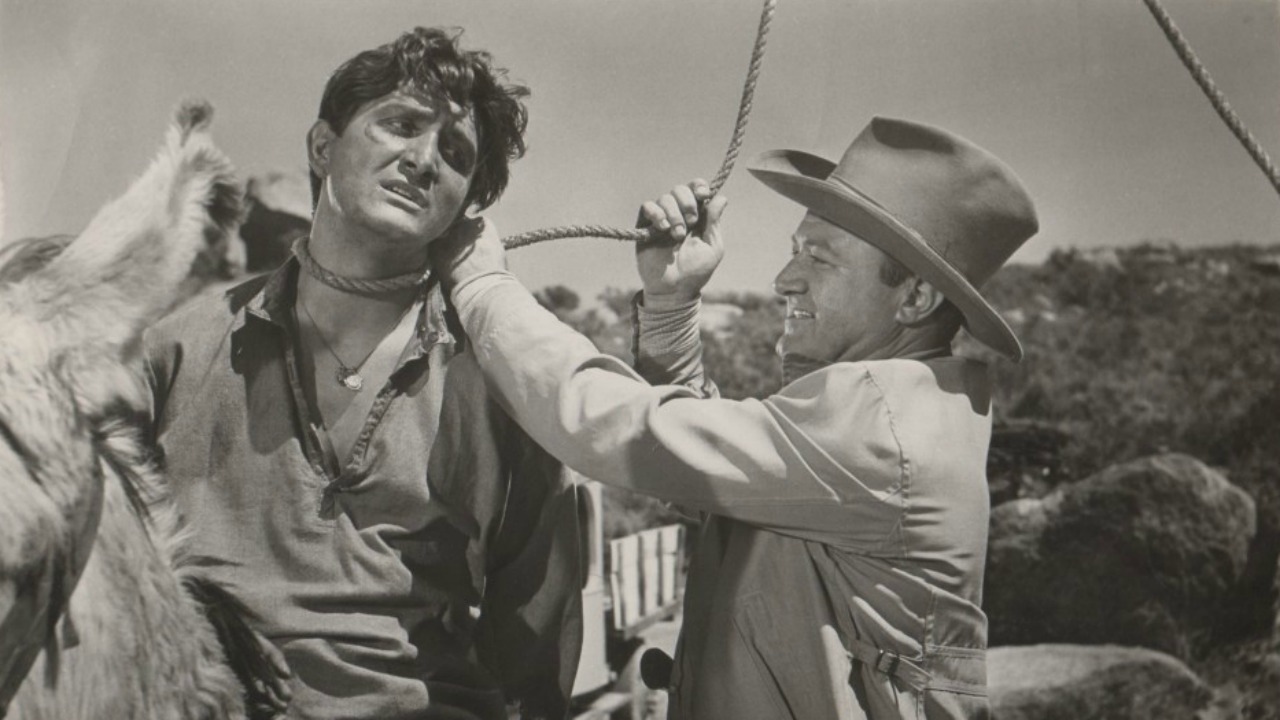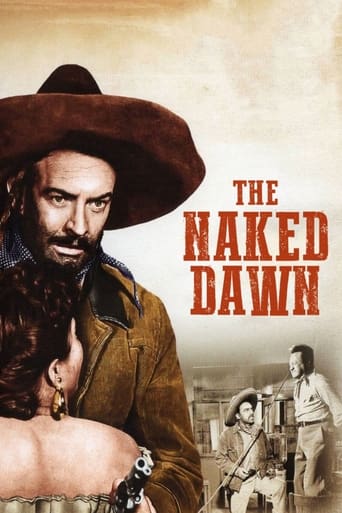

The movie's not a western in the usual sense. Instead, it's more like a pondering of character and life-styles set in modern Mexico. Manuel and Maria are in an arranged marriage, she being passed along like a piece of property, he being a budding farm entrepreneur. They are above all "respectable", and the feeling is that this is what holds the marriage together. Then, into their settled life arrives escaping train robber Santiago. But he's not a typical robber. We know that from his buddy's moving death scene. There Santiago shows something of a poetic sensitivity, proving he's not without his own sense of values. In fact, he's more a free spirit than a criminal type, even giving away much of his loot to deserving strangers. Ironically, however, he appears unfree to be anything but free! It's Santiago's free-wheeling effect on the young couple's brittle marriage that makes up the storyline. Kennedy, of course, was one of that era's premier actors. Here, his bravura performance effectively dramatizes Santiago's free spirit gusto. On the other hand, as the young couple, Iglesias and St. John appear over-the-top at times. Perhaps that can be rationalized by their emotional release from repressed lives. Nevertheless, the emoting does at times distract from story advancement.The notion of respectability is also pondered here. What the screenplay seems to be saying is that conforming lives are okay as long as one's humanity is not sacrificed in the process. In his own eccentric way, this appears the lesson Santiago imparts to the young couple. At the same time, religion gets much the same treatment, while criminal Santiago acts poetically as a kind of secular priest in easing his dying confederate into the great unknown.All in all, the movie's distinctive features come more from blacklisted writer Zimet's offbeat screenplay than from cult director Ulmer who's required to film in Technicolor instead of his b&w forte. Nonetheless, the movie's fully deserving of the Ulmer brand-- an offbeat 80-minutes that manages some depth over and above its tacky 50's title.
... View MoreA compelling movie of a different kind. When a low budget movie that was filmed in 10 days with very few characters, markedly rivets ones attention, that is a telltale sign of a a good and unusual production. The attire and settings were very convincing. The three leading characters all portrayed Hispanics extremely unusual for a 1950s western. The acting/directing was very good. The movie discusses female servitude/abuse; and the lure of money and its impact on ones loyalty, profession, and romantic decisions. With few characters and a low budget, the movie project took the very little and turned into quite an interesting and believable flick, of a different kind, that found time to examine core aspects of human behavior. In the same general genre as For Whom the Bell Tolls, but yet so different. Wow!!
... View MoreKing of the cheapies Edgar Ullmer directed this modern west saga set in Mexico with something he normally didn't have at his disposal, technicolor. Even with that it's certainly one parsimonious production, but not bad.Although why he cast Arthur Kennedy replete with dyed black hair and a greasy beard as a Mexican bandit who knows. This was a role so right for Gilbert Roland. I guess he wasn't available.Nevertheless Kennedy gives it his best as the charismatic bandit who after losing one partner doing a job is ready for another. He takes refuge in the house of farmer Eugene Iglesias and wife Betta St.John. In one way or another he seduces both of them with what they see as a romantic life style. Both want to go off with him and leave the other.The Naked Dawn is a curious little film, deep in character rather than plot. But I think it would have been a classic with a Gilbert Roland or a Fernando Lamas in the lead.
... View MoreThere is something very likable about this low budget, "poetic" story of an aging outlaw who comes upon the small farm of an ambitious peon and his willful wife. The atmosphere is a bit thick perhaps, constant philosophizing in a "poetic" Spanish accent, with a guitar playing in the background. But Kennedy is particularly good as the outlaw, worldly-wise and mellow with flashes of toughness, anger and cynicism. The other players carry their weight well enough, though Iglesias sometimes goes a bit overboard with his characterization of the naive, greedy young man. There's not much to the story, but it's well told. Here, certainly, is a film that, whatever its ultimate virtues, is unique. Though the subject makes it a Western, the style (as well as the Mexican setting and the apparent thirties time-frame) makes it something completely different. This is the sort of film one expects from Ulmer's reputation; small but personal. I really did like it, but I don't know if I would go as far as Francois Truffaut: "Poetic and violent, tender and droll, moving and subtle, joyously energetic and wholesome... reminds us inevitably of Renoir and Ophuls."
... View More